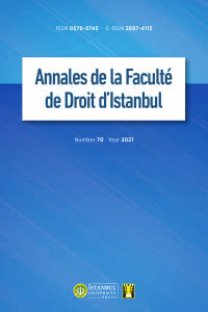Evaluation of the Turkish Constitutional Court’s Decisions Regarding Transsexuals’ Individual Applications Following the Rejection of Their Name Change Requests
Evaluation of the Turkish Constitutional Court’s Decisions Regarding Transsexuals’ Individual Applications Following the Rejection of Their Name Change Requests
A person’s name distinguishes them from others and makes them unique. Due to its importance, the principle of the invariance of the name has been accepted as a rule in the Turkish Civil Code No. 4721 (TCC). However, a person can request the change of a name that they do not identify with from the court, only on the basis of valid reasons, pursuant to TCC art. 27. One of these valid reasons, which is frequently encountered in judicial decisions, is that the person is known by another name in their social life. Despite the fact that they are based on such a valid reason, which is generally accepted in the decisions included in this study, some name change requests of transsexuals were rejected by local courts as the issue was associated with gender reassignment, and the applicant then made individual applications to the Constitutional Court. Regarding these applications, the Constitutional Court decided that the right to respect for private life had been violated. The aim of this study is to examine the name change in light of these two recent decisions of the Constitutional Court.
___
- Akipek JG, Akıntürk T and Ateş Karaman D, Türk Medeni Hukuku Başlangıç Hükümleri, Kişiler Hukuku (Beta 2013).
- Ayan M and Ayan N, Kişiler hukuku (Seçkin 2016).
- Büchler A, ‘Art. 30’ (Ed. Jolanta Kren Kostkiewicz, Stephan Wolf, Marc Amstutz, Roland Fankhauser) ZGB Kommentar Schweizerisches Zivilgesetzbuch, OFK - Orell Füssli Kommentar (Swisslex 2021).
- Dural M and Öğüz T, Türk Özel Hukuku, Cilt II, Kişiler Hukuku (Filiz 2006).
- Erdoğan İ, ‘Şahsiyeti İncitici Soyadı Meselesi’ (1998) 6/1 Selçuk Üniversitesi Hukuk Fakültesi Dergisi, 705-712.
- Erdoğan İ and Keskin D, Türk Medeni Hukuku (Başlangıç Hükümleri-Kişiler Hukuku) (Gazi 2019).
- Güven K, ‘Cinsel Kimlik Üzerinde Hak Kavramı ve Korunması: Transseksüellik ve İnterseksüellik’ (2015) 1/1 Başkent Üniversitesi Hukuk Fakültesi Dergisi, 133-176.
- Helvacı S, Gerçek Kişiler (Legal 2021).
- Özbilen AB, ‘Mahkeme Kararına Dayanmayan Ad ve Soyadı Değişiklikleri (Nüfus Hizmetleri Kanunu Geçici Madde 8 Hükmüne Bir Bakış)’ (2019) 40 TBB Dergisi, 193-220.
- Özdemir H, ‘Türk ve İsviçre Medenî Hukukunda Ad Üzerindeki Hak ve Korunması’ (2008) 57/3 AÜHFD, 561- 598.
- Özsunay E, Gerçek Kişilerin Hukuki Durumu (Sulhi Garan Matbaası 1977).
- Öztan B, Kişiler Hukuku, Gerçek Kişiler (Yetkin 2021).
- Ruhi AC and Ruhi C, Nüfus Davaları (Seçkin 2017).
- Säcker FJ, ‘BGB § 12 I–XII’ (Ed. Claudia Schubert) Münchener Kommentar zum Bürgerlichen Gesetzbuch, Band 1, Allgemeiner Teil §§1-240 (C. H. Beck, 2021).
- Serozan R, Medeni Hukuk, Genel Bölüm/ Kişiler Hukuku (Vedat 2013).
- Steadman S, ‘ ‘That Name is Dead To Me’: Reforming Name Change Laws To Protect Transgender And Nonbinary Youth’ (2021) 55/1 University of Michigan Journal of Law Reform 1-44.
- Turan Başara G, ‘Türk Medeni Kanunu’nun 40’ıncı Maddesi Kapsamında Cinsiyet Değişikliği ve Hukukî Sonuçları’ (2012) 103 TBB Dergisi 245-266.
- Will MR and Öztan B, ‘Hukukun Sebebiyet Verdiği Bir Acı- Transseksüellerin Hukuku Durumu’ (1993) 43/1 AÜHFD 227-268.
- Yılmaz S and Yıldırım A, Medeni Hukuk-I (Başlangıç Hükümleri- Kişiler Hukuku- Aile Hukuku) (Seçkin 2021).
- Zeytin Z and Ergün Ö, Türk Medeni Hukuku (Seçkin 2020).
- www.lexpera.com.tr
- karararama.yargitay.gov.tr
- www.resmigazete.gov.tr
- ISSN: 0578-9745
- Yayın Aralığı: Yılda 2 Sayı
- Başlangıç: 1951
- Yayıncı: İstanbul Üniversitesi
